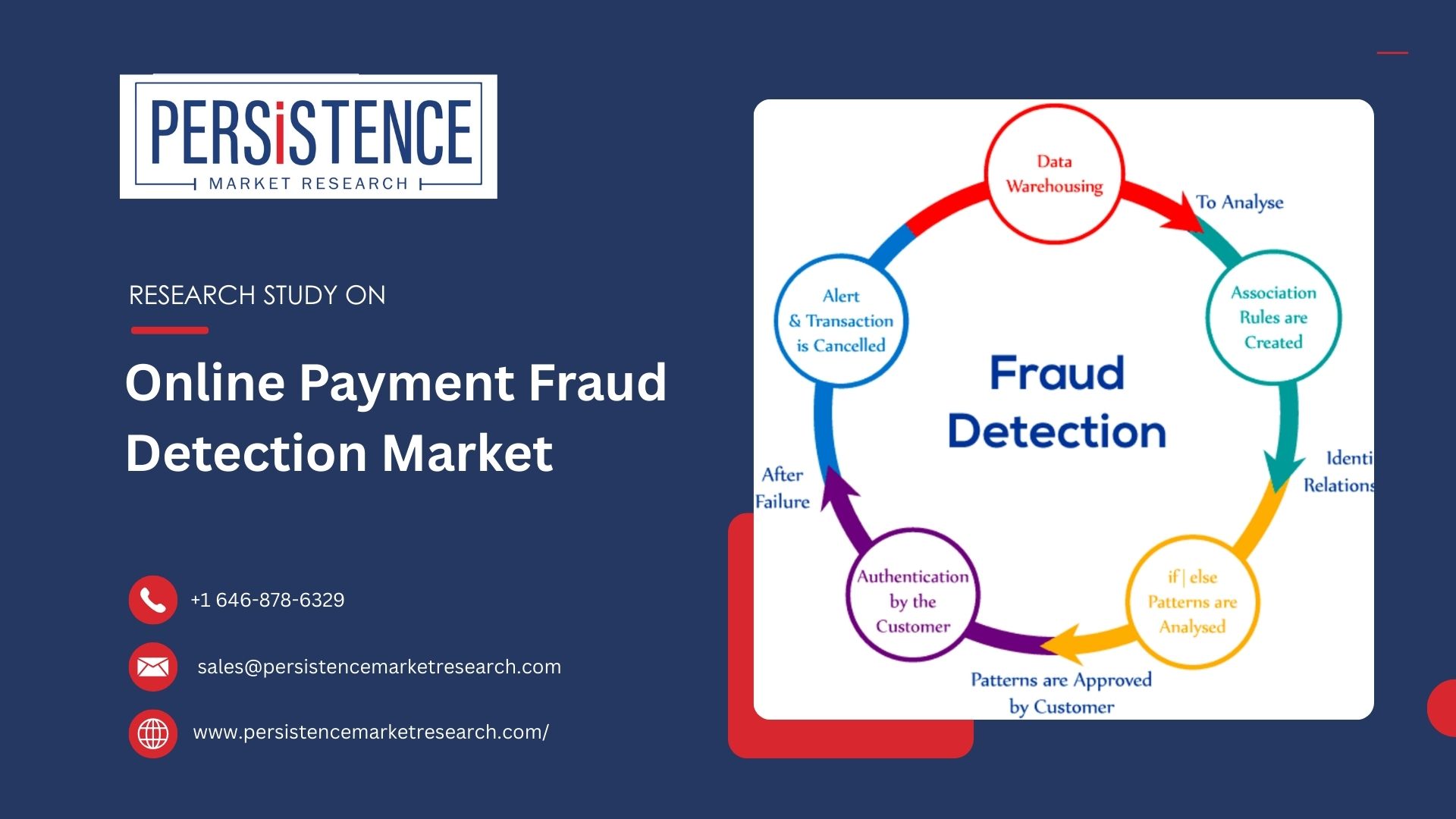Which Verticals Are Investing Most in Online Payment Fraud Detection? Market Insights Inside

Strong 8k brings an ultra-HD IPTV experience to your living room and your pocket.
The surge in digital payments over the last decade has revolutionized global commerce, making transactions faster, easier, and more convenient. However, this rapid digital transformation has also opened the door for increasingly sophisticated online payment fraud. From identity theft to card-not-present fraud, cybercriminals have become adept at exploiting vulnerabilities in digital payment systems, causing significant financial losses for businesses and consumers alike. As a result, the demand for robust online payment fraud detection solutions is at an all-time high.
According to Persistence Market Research’s projections, the global online payment fraud detection market is expected to grow from US$ 8,090.8 million in 2025 to US$ 19,997.9 million by 2032, reflecting a Compound Annual Growth Rate (CAGR) of 13.8% during the forecast period from 2025 to 2032. This rapid growth underscores the increasing urgency for businesses across different sectors to adopt advanced fraud detection tools and strategies.
But which sectors are investing the most in fraud detection solutions? Which verticals are recognizing the critical need for secure, seamless transactions in their operations? In this blog, we will explore the key verticals investing heavily in online payment fraud detection and the factors driving this investment.
1. E-Commerce and Retail: Protecting Consumers and Revenue
E-commerce and retail industries are at the forefront of adopting online payment fraud detection technologies, driven by the sheer volume of online transactions and the growing prevalence of fraud. E-commerce platforms face numerous risks, including card-not-present fraud, account takeovers, chargebacks, and fake returns. According to Statista, global e-commerce sales are projected to exceed US$ 7 trillion by 2025, making it a prime target for fraudsters.
Key Drivers for Investment:
• High Transaction Volume: E-commerce platforms handle millions of transactions every day, making them a lucrative target for cybercriminals. Fraud detection solutions, such as machine learning (ML)-powered fraud detection engines, are employed to continuously monitor transactions and identify anomalies that suggest fraudulent activity.
• Customer Trust: E-commerce companies understand that trust is vital in their relationship with customers. A single fraudulent transaction or data breach can result in a significant loss of consumer confidence and revenue. To protect customer data and safeguard their reputation, companies in the e-commerce sector are investing heavily in fraud detection solutions.
• Omnichannel Payments: With the rise of omnichannel shopping experiences, fraud detection solutions must be capable of monitoring transactions across different platforms—whether online, in-store, or through mobile apps. E-commerce businesses are investing in advanced fraud detection tools that provide a seamless experience across all customer touchpoints.
Fraud detection technologies in this vertical are increasingly relying on AI-driven algorithms, behavioral biometrics, and real-time transaction monitoring to stay ahead of fraud tactics.
2. Financial Services: Securing Transactions in a Highly Regulated Industry
The financial services industry is one of the largest investors in online payment fraud detection systems. Financial institutions, including banks, payment processors, and insurance companies, deal with vast amounts of sensitive financial data. They are prime targets for fraud, from credit card fraud and identity theft to phishing schemes and account takeover.
The sector faces significant pressure due to strict regulatory requirements, such as PCI-DSS (Payment Card Industry Data Security Standard) and PSD2 (Revised Payment Services Directive), which mandate the implementation of robust security measures to prevent fraud.
Key Drivers for Investment:
• Regulatory Compliance: Financial institutions are required to meet stringent compliance standards, and failure to comply with security protocols can lead to significant fines and reputational damage. As part of compliance, these institutions are investing in fraud detection solutions that ensure secure payments and protect sensitive customer data.
• Prevention of Fraudulent Transactions: Financial services companies have direct financial exposure to fraud, making them more likely to invest in fraud detection technologies. These solutions allow institutions to verify transactions in real-time and identify suspicious activity early, reducing the risk of financial loss.
• AI and Machine Learning: AI and machine learning have revolutionized the way financial institutions approach fraud detection. These technologies help organizations detect unknown fraud patterns by analyzing large volumes of transaction data and continuously adapting to new fraud techniques.
In this vertical, fraud detection systems are increasingly focusing on transaction monitoring, multi-factor authentication (MFA), and machine learning models to enhance fraud detection and prevention.
3. Healthcare: Safeguarding Sensitive Data and Payments
The healthcare sector has seen a dramatic increase in the use of digital payment solutions for services such as insurance claims, medical billing, and online healthcare consultations. However, the rise of digital payments has also opened new avenues for fraud, including fraudulent claims, stolen medical identities, and compromised patient accounts.
Key Drivers for Investment:
• Sensitive Data Protection: Healthcare organizations deal with some of the most sensitive personal and financial information, making them a prime target for cybercriminals. Fraud detection technologies help safeguard patient data, ensuring compliance with regulations like HIPAA (Health Insurance Portability and Accountability Act) while preventing financial fraud.
• Preventing Fraudulent Claims: Fraudulent insurance claims and billing errors are a significant issue in the healthcare sector. Detecting and preventing these fraudulent activities is crucial for healthcare providers and insurers. AI-powered fraud detection tools are used to flag suspicious claims, verify the legitimacy of charges, and prevent billing fraud.
• Increased Adoption of Telehealth: With the rise of telemedicine and online health consultations, there is a growing need for fraud detection solutions that can secure digital payments in virtual healthcare environments. Healthcare organizations are investing in fraud detection technologies to protect both their revenue and their patients’ personal data.
Fraud detection solutions in healthcare often involve real-time transaction monitoring, user authentication, and data encryption to ensure that medical and financial transactions are secure.
4. Travel and Hospitality: Mitigating Booking Fraud and Chargebacks
The travel and hospitality industry is another sector that has witnessed significant growth in digital payments. Online bookings for flights, hotels, car rentals, and vacation packages have become the norm. However, the travel industry is especially vulnerable to fraud, including fraudulent bookings, account takeovers, and chargebacks.
Key Drivers for Investment:
• High-Value Transactions: Travel transactions, such as flight bookings and hotel reservations, are often high-value and are prime targets for fraudsters looking to exploit stolen payment information. Travel companies are investing in fraud detection systems to minimize losses from chargebacks and fraudulent bookings.
• Preventing Account Takeovers: Fraudsters frequently target travel and hospitality platforms by stealing user credentials and taking over accounts to make fraudulent bookings. Fraud detection solutions that include multi-factor authentication and behavioral biometrics are increasingly being adopted in the industry to prevent unauthorized access.
• Seasonal Nature of Fraud: Fraudulent activity often spikes during peak travel seasons. Travel companies must be prepared to detect and prevent fraud in real-time, especially when the volume of bookings increases. Transaction monitoring and real-time fraud detection systems are essential to maintaining security during high-volume periods.
Fraud detection systems in this vertical often rely on multi-layered security measures, such as AI-driven fraud detection and dynamic authentication, to ensure secure and seamless transactions.
5. Telecommunications: Protecting Mobile Payments and Subscription Services
The telecommunications industry has rapidly embraced digital payment solutions for services ranging from mobile top-ups to subscription-based models. Fraud in this sector often involves SIM swap fraud, account takeovers, and fraudulent mobile payments. As telecom companies adopt more digital payment systems, the demand for fraud detection solutions is also rising.
Key Drivers for Investment:
• SIM Swap Fraud: Fraudsters often use SIM swap techniques to take control of a user’s phone number, allowing them to gain access to accounts that rely on phone-based authentication. Telecom companies are investing in AI-powered fraud detection to prevent such fraudulent activities.
• Subscription Fraud: Telecom companies offering subscription-based services, such as streaming or mobile services, face risks related to unauthorized account access, fraudulent payments, and identity theft. Fraud detection solutions that provide real-time monitoring and account verification are crucial to prevent losses in this sector.
• Mobile Payments Security: With the rise of mobile payments, telecom companies need robust fraud detection systems to safeguard these transactions. AI, machine learning, and biometric authentication are becoming key tools in securing mobile payments.
Fraud detection systems in the telecom industry often include multi-factor authentication (MFA), real-time transaction analysis, and AI-driven behavior analysis to identify fraudulent activity across mobile platforms.
Conclusion: The Expanding Role of Fraud Detection Across Verticals
The global online payment fraud detection market is set to grow rapidly, from US$ 8,090.8 million in 2025 to US$ 19,997.9 million by 2032, at a CAGR of 13.8%. As fraud becomes an ever-present threat, sectors like e-commerce, financial services, healthcare, travel, and telecommunications are leading the charge in investing in fraud detection solutions. These industries are recognizing the immense value of protecting their customers’ data, preventing financial losses, and maintaining trust in their digital platforms.
The key drivers for this investment are varied—ranging from regulatory compliance to the need to secure high-value transactions and maintain consumer trust. As fraudsters continue to evolve their tactics, businesses across all sectors will need to embrace cutting-edge technologies such as AI, machine learning, biometric authentication, and real-time transaction monitoring to stay one step ahead and protect their operations from fraud.
Note: IndiBlogHub features both user-submitted and editorial content. We do not verify third-party contributions. Read our Disclaimer and Privacy Policyfor details.







